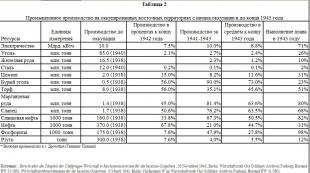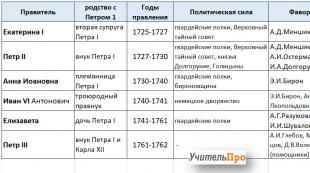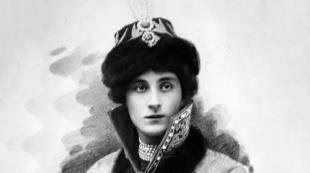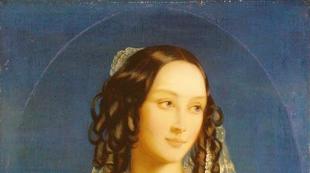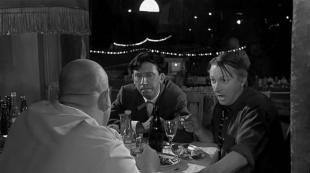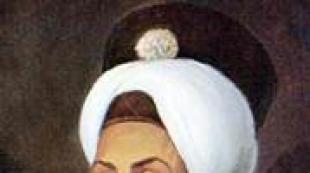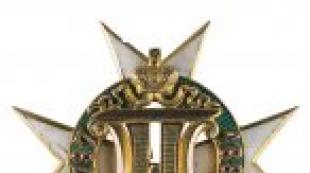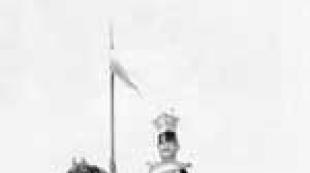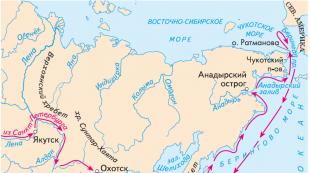S n Fedorov biography briefly. Svyatoslav Fedorov - biography, personal life: A scientist who opened his eyes. Public and political activities
Biography and episodes of life Svyatoslav Fedorov. When born and died Svyatoslav Fedorov, memorable places and dates of important events in his life. Ophthalmologist Quotes, Photo and video.
Years of life of Svyatoslav Fedorov:
born August 8, 1927, died June 2, 2000
Epitaph
“Such an emptiness after death.
And the heart is ground with screws
And speeches over the grave are vanity.
Land above buried dreams.
From a poem by Yuri Furmanov dedicated to the memory of Svyatoslav Fedorov
Biography
Svyatoslav Fedorov firmly established himself on the pages of the history of medicine in our country as a talented researcher and innovator in the field of eye microsurgery. It is fair to say that the amazing character and ability to work of this man advanced Soviet science a quarter of a century forward.
Since childhood, Svyatoslav dreamed of becoming a pilot, but as a result of an accident he lost his leg. As a result, the young man was not taken to the flight school, but was accepted to the medical institute. Fedorov studied enthusiastically, with soul, and after graduating from the institute, he got a job as a practicing doctor in a small province of the Rostov region. In a few years, the future genius will perform a completely successful and, most importantly, innovative for Soviet medicine operation to replace the lens of the eye. This event, like a springboard, will lift Fedorov's medical career to the very heights.

In the future, Svyatoslav Fedorov continues to study the prospects for implanting an artificial lens and devotes dozens of reports, articles and books to this topic. And every time theoretical discoveries bring practical benefits - Fedorov becomes the world record holder in the number of operations performed with the implantation of the lens of the eye (their number exceeds two hundred). For an unprecedented contribution to science, Svyatoslav Fedorov is repeatedly awarded prizes in Russia, the USA and Europe.
In the 90s. 20th century Fedorov took an active part in the political life of the country. He was elected a people's deputy of the USSR, later a deputy of the State Duma, and in 1996 he ran for the presidency of Russia. In addition, Svyatoslav Fedorov headed his own Workers' Self-Government Party and was on the editorial board of the Ogonyok magazine.
The death of Svyatoslav Fedorov came due to tragic circumstances on June 2, 2000. On that day, Fedorov and his colleagues were returning from a conference to Moscow in a helicopter belonging to their clinic. The helicopter crashed near the Moscow Ring Road, and as a result of the disaster, no one managed to survive. At the site of the accident, a chapel of the icon of the Mother of God is now installed. The funeral of Svyatoslav Fedorov took place a few days later at the cemetery of the village of Rozhdestvenno-Suvorovo in the Moscow region.

life line
August 8, 1927 Date of birth of Svyatoslav Nikolaevich Fedorov.
1945 Amputation of the left foot as a result of an accident.
1952 Appointment to the position of a surgeon in the city hospital of Lysva, Perm region.
1960 The first operation in the USSR to replace the lens of the eye under the supervision of Fedorov.
1961 Appointment to the post of head of the department of eye diseases at ASMI.
1962 Creation of the Fedorov-Zakharov lens - innovations in the field of eye surgery.
1973 The first operation for the treatment of glaucoma in the early stages.
1980 Appointment to the post of head of the Moscow Research Institute of Eye Microsurgery.
June 2, 2000 Date of Fedorov's death.
June 6, 2000 Date of the funeral of Svyatoslav Fedorov.
Memorable places
1. MNTK Fedorov in Moscow - an intersectoral scientific and technical complex "Eye Microsurgery", named after Svyatoslav Fedorov.
2. Fedorov Park in Moscow, where a monument to Svyatoslav Fedorov is erected.
3. Monument to Fedorov in Kaluga (on the territory of the branch of the IRTC "Eye Microsurgery").
4. Monument to Fedorov in Volgograd (on the territory of the branch of the MNTK "Eye Microsurgery").
5. Monument to Fedorov in St. Petersburg (on the territory of the branch of the MNTK "Eye Microsurgery").
6. Chapel of the Icon of the Mother of God of Fedorov, erected on the site of Fedorov's death.
7. The village of Rozhdestvenno-Suvorovo in the Mytishchi district of Moscow, where Svyatoslav Fedorov is buried.
Episodes of life
In the life of Svyatoslav Fedorov was inspired not only by science. It is known that he was a noble connoisseur of horses, motorcycles and aircraft. The dream of becoming a pilot appeared in Fedorov as a child and, apparently, has not disappeared anywhere over the years. Fedorov's wife recalled that wherever they had to fly, Svyatoslav Nikolaevich never sat with her, but only in the cockpit, even if it was a public Aeroflot flight.
As a child, Fedorov tragically lost his foot and used a prosthesis for the rest of his life. However, the doctor never complained about his health: it was not his style. And Fedorov also reacted ironically to other people's complaints: “How can a head hurt? It's a bone," he joked.
Covenant
“Love is he, she and space. And it is still unknown who is the most important.
Documentary film about Svyatoslav Fedorov
condolences
“Fedorov blew up ophthalmology from the inside. He gave the Soviet people an artificial lens. Abroad, such experiments were carried out, but they were far from always successful, and in the USSR they were considered charlatanism. But Svyatoslav Nikolaevich took a chance! In addition, for the first time in the world, he began to perform vision correction operations using the keratotomy method (making notches on the cornea), he was the first in the country to use a donor cornea, he developed a method of non-penetrating glaucoma surgery, he was one of the first to introduce operations using lasers ... He was a man- a block, a scientist-block, without exaggeration.
Zinaida Moroz, professor of IRTC "Eye Microsurgery"
“And I sometimes turn to him, I don’t even have to look at his photo: “Dad, what do you think, advise ...”. I probably just believe in its absolute power. Of course, I don’t hear him answer me in words, but all the problems that I address to him are being resolved. I am convinced that such people cannot and should not disappear without a trace.”
Irina Fedorova, daughter
A real hero, a scientist, a courageous man Fedorov Svyatoslav Nikolaevich, a biography whose personal life continues to interest the public even today, years after his death, is an example of an unprecedented determination and will to live. The saturation of his life, the passion with which he devoted himself to every business, had such intensity that only a real hero could withstand such a rhythm.
Childhood and parents
On August 8, 1927, in the Ukrainian city of Proskurov, which today is called Khmelnitsky, Fedorov Svyatoslav Nikolaevich was born. Svyatoslav's father was once a worker, then became a Red Army soldier, rose to the rank of brigade commander and the rank of general. In 1930, the family moved to Kamenetz-Podolsky in connection with the transfer of his father. Nikolai Fedorov went through the First World War and the Civil War. He was a professional military man, a man of his word and honor. But, when the boy was 11 years old, his father was arrested on a denunciation and sentenced to 17 years. A label stuck to Fedorov - an enemy of the people. Svyatoslav tried his best to prove that he was no worse than others, perhaps it was then that a steel, fighting character began to form in him. After the arrest of his father, the family moves to relatives in Rostov-on-Don to avoid repression.
Studies
At school, Svyatoslav Nikolaevich Fedorov studied well, although chemistry was given to him with great difficulty. He also did not like to write essays, but he easily managed in a foreign language and graduated from school with a silver medal. Like many boys of that time, he was fanatically in love with aviation and dreamed of becoming a pilot. When the war began, Fedorov wanted to volunteer, but due to his youth, of course, no one took him into the army. Then in 1943 he entered the Yerevan Preparatory School in order to quickly master the skills of piloting. For two years he studied hard, dreaming of the sky and how he would beat the enemy. But life turned out differently.
tragic turn
In 1945, Svyatoslav Nikolaevich Fedorov, whose biography makes a sharp turn, gets into an accident. The young man was in a hurry for a festive evening at the school. In an attempt to catch up with the tram, he stumbled and injured his left leg. In the hospital where he was brought, it turned out that the heel was crushed, and the doctor decided to amputate the foot and a third of the lower leg. Fedorov had to forget about aviation. He spent several months in the hospital and there he made some of the most important decisions of his life. He saw masses of crippled men who gave up and thought their lives were over. Svyatoslav, overcoming pain, began to swim and even won several competitions with full-fledged athletes. Then he realized that you need to work hard - and everything is possible. And for the rest of his life, Fedorov worked hard. He proved to everyone that he was not disabled, and later many simply did not know about his injury. The second decision made by a young man in these years is connected with the choice of a professional field.

The medicine
In 1947, Svyatoslav Nikolaevich Fedorov entered the Rostov Medical Institute. After graduating from it in 1952, he entered the residency, and then the graduate school. Even in his student years, Svyatoslav chose his specialization, ophthalmology. He realized that the human eye is a complex optical instrument and needs to be fine-tuned. Upon graduation, he begins working as an ophthalmologist in the village of Veshenskaya, where the famous writer Mikhail Sholokhov once lived and worked. Fedorov said more than once that the writer became his moral ideal for many years. In 1957 he defended his PhD thesis. Fedorov spent his first time in his student years. He happened to operate on a locksmith who had a piece of an iron chisel stuck into his eyeball. The manipulation was the most difficult, but Svyatoslav coped and was able to save the patient's eyesight.

Medical career
Since the mid-1950s Fedorov Svyatoslav Nikolaevich has been working as a practicing physician. After the Don village, he moved to the Urals, where he is engaged in eye surgery. While working in Cheboksary, he performed a unique operation for the USSR to replace the affected lens with an artificial one. Soviet medicine could not stand such a step, and Fedorov was fired from his job "for charlatanism." He moves to Arkhangelsk, where he becomes the head. Department of Eye Diseases at the Medical Institute. Quite quickly, a team of like-minded people is formed around Fedorov, the fame of doctors-wizards is spreading throughout the country, and people who dream of restoring their sight have reached Arkhangelsk.
In 1967, the official confirmation of the achievements of Svyatoslav Nikolaevich came. He is transferred to Moscow, where he is the Third Med. Institute headed the Department of Eye Diseases and led the laboratory for the creation of an artificial lens. Here Fedorov begins to experiment with operations to install an artificial cornea. In 1974 Stanislav Nikolaevich's laboratory separated from the structure of the Institute and became an independent research institution in the field of eye surgery.
Scientific activity
Since the 50s, Fedorov Svyatoslav Nikolayevich began to engage in science and did not leave his research until the end of his life. In 1962, together with him, he created the best rigid lens in the world, the so-called Fedorov-Zakharov lens. In 1967 he successfully defended his doctoral dissertation. In 1973, he was the first in the world to perform surgical therapy for glaucoma in the early stages. The method of sclerectomy discovered by him received worldwide recognition and is still used in all leading clinics in the world. In 1987, Fedorov became a corresponding member of the USSR Academy of Sciences. In 1995 he was elected a full member of the Academy of Medical Sciences of the Russian Federation.

Clinic
In 1979, the laboratory, managed by Svyatoslav Nikolayevich Fedorov, was turned into the Research Institute of Eye Microsurgery. And in 1986 the Institute was transformed into a scientific and technical complex "Eye Microsurgery". Fedorov performs the most complex operations, actively shares his experience with young surgeons, and conducts scientific research. The fame of his clinic reaches the world scale. Changes are taking place in the country, a market economy is starting to work. And during this period, Fedorov showed himself in another incarnation. The clinic had legal and financial freedom, Svyatoslav Fedorovich could set the cost of operations himself. "Microsurgery of the eye" begins to earn a lot, including in foreign currency. Fedorov set high salaries for doctors and staff, he creates comfortable conditions for patients. For several years, he opens several modern branches in the regions of the country where his best students work. Eye surgeries become commonplace, and Fedorov becomes a successful entrepreneur and a wealthy person. But along with it, the clinic is getting richer. In a few years, he turns the complex into an entire empire. Eye Microsurgery not only has many branches in the country and abroad, but also a huge Protasovo complex with hotels and residential buildings, a dairy plant, a plant for the production of drinking water, two large enterprises for the production of frames, lenses, surgical instruments. The clinic even had a specially equipped ship "Peter the First", on which operations were carried out. Fedorov built his own aviation facilities for the clinic with a hangar, a helicopter, an airplane, a runway, a radio station and a gas tanker. The academician himself supervised everything, but there were not enough hands for everything, and in recent years many people began to appear in the clinic who were only thirsty for profit. This undermined the team spirit, there was discontent, envy. For Fedorov, all this was a difficult problem.

Main achievements
Academician Svyatoslav Nikolaevich Fedorov made many discoveries in his life, he owns the right to 180 patents for various inventions. His main achievement is more than 3 million people successfully operated on according to his technique around the world. He published several serious works, which today allow the development of ophthalmology.
Awards
Fedorov Svyatoslav Nikolaevich, whose biography is filled with constant work, received many titles and awards in his life. In 1987 he was awarded the title of Hero of Social Labor. Fedorov was a holder of the orders: Lenin, the Red Banner of Labor, the October Revolution, the Badge of Honor, Friendship. The list of his medals is very long, among them: the gold medal "Hammer and Sickle", the medal to them. M. Lomonosov Academy of Sciences of the USSR. Svyatoslav Nikolayevich was awarded the title of Honored Inventor of the USSR. In 2002, the international awarded him the title of "The Greatest Ophthalmologist of the 19th and 20th centuries." On his account there are many awards, including the state award of the Russian Federation, the awards of Paleolog, Pericles, them. and M. Averbukh from the Academy of Medical Sciences.

Political activity
With the beginning of perestroika, Svyatoslav Nikolayevich Fedorov (photo attached to the article) became actively interested in politics. In 1989, he was elected a People's Deputy of the USSR and for 2 years participated in the lawmaking of a new, emerging country. He actively met with voters, conducted political campaigning, and was a member of the editorial board of the Ogonyok magazine. Fedorov created and headed the workers' self-government party, which was based on left-liberal views. In 1995, Stanislav Nikolayevich was elected to the State Duma. In 1996, he even participated in the presidential elections in the Russian Federation, finishing sixth with 0.92% of the vote. Having served in the Duma for one term, Fedorov did not run again, because he did not see a real return on his activities, and he was a man of deeds and results. In the last years of his life, he focused on the development of the clinic.

Personal life
Fedorov Svyatoslav Nikolaevich, whose personal life is of interest to many, was married three times. Incredible charm and magnetism emanated from him, and women fell in love with him instantly. If in his professional activity Fedorov was purposeful, assertive, extremely hardworking, then in his private life he was a very calm and compliant person. He never scolded, considering it an unworthy matter, he liked to rely on someone else in everyday affairs, he easily joined the opinions of other people. Therefore, some considered him henpecked, but, most likely, this was just his position. At work he was a force and leader, and at home he was a companion and assistant. Fedorov Svyatoslav Nikolayevich, whose family was a safe haven, a refuge, treated women with respect and reverence, therefore he calmly gave them a leading role in ordinary life. Although this did not apply to matters of principle - they could not be twirled like a puppet, he always adhered to his convictions.
Wives and children
Academician Fedorov had three wives in his life. The first marriage happened at the beginning of Svyatoslav Nikolayevich's medical career. Lilia, the first wife, was a chemist by training. They met on vacation in a youth digging, the girl was struck by Fedorov's courtship. And six months later, secretly from her parents, she married him, having come to him. For the first six months, the couple lived in different cities, Lilia completed her studies at the institute. And then there were 13 years of a happy life. Stanislav's letters to his wife have been preserved, in which they are full of love and tenderness. The couple had a daughter, Irina. From childhood, she was fascinated by her father's profession and already from the 9th grade she knew that she would follow in his footsteps. Today she is a practicing surgeon, working in Fedorov's clinic. The second wife of Fedorov was Elena Leonovna. In this marriage, a girl, Olga, was also born. Today she is engaged in the activities of the memorial office at the Eye Microsurgery clinic. This marriage also fell apart. Irene burst into Fedorov's life. Once she came to his office to arrange an operation for her relative, and was immediately struck by the strength and energy of the surgeon. No children appeared in this marriage, but he raised the two twin girls that Irene had from her first marriage as his daughters. Both girls today work in the Foundation for the Popularization of the Methods of the Surgeon Fedorov. After the death of the head of the family, newspapers wrote about conflicts among the heirs. Fedorov Svyatoslav Nikolaevich, for whom children were a very important part of his life, until the end of his days he maintained good, friendly relations with all his daughters, arranged them for him in various positions. But with his previous wives, he did not develop relationships.

Hobbies and lifestyle
In addition to work and family, Fedorov Svyatoslav Nikolaevich, whose wives and children were a big, but not the only part of his life, had many hobbies. All his life he did a lot of sports: he swam, he was a great rider. He did not smoke, hardly drank, was not a fan of any food. At 62, he was able to realize his youthful dream and sat at the helm of his own plane. By helicopter, he flew to regional offices for operations. His life, of course, was most filled with work, but he managed to get pleasure from it.
Death and memory
On June 2, 2000, tragic news spread around the world: Fedorov Svyatoslav Nikolaevich died. His death was the result of a plane crash, he was at the controls of a helicopter that crashed due to malfunctions. After the death of the academician, his family repeatedly said that the tragedy was not an accident. But investigators and journalists have not found evidence of this. The memory of the surgeon was immortalized in street names in cities such as Kaluga and Cheboksary. In Russia, 6 monuments to Svyatoslav Fedorov have been erected. Two ophthalmological institutions in Moscow bear his name.
He gave people the opportunity to see the world with all the clarity and brightness of colors. If the doctors refused the patient, then the MNTK "Eye Microsurgery" tried to help to the last. For Svyatoslav Fedorov, there was nothing more important than his profession. And for Iren Fedorova there was no one in her life more important than Svyatoslav Nikolaevich Fedorov.
Postgraduate student Ivanova

Svyatoslav Fedorov examining a patient, 1968
When Iren Kozhukhova was called by her aunt from Tashkent with a request to find an ophthalmologist Fedorov, the girl could not even imagine what this would turn out to be in her life.
Having already knocked down in search of a doctor, Irene found out about his place of work quite by accident, from a conversation with a friend. But making an appointment turned out to be an almost impossible mission: the queue for the magician who restores people's sight was scheduled for many months in advance.
Then she went to the trick and, calling the hospital where Fedorov worked, introduced herself as his graduate student Ivanova. Through his secretary, he made an appointment for her on Saturday. By the way, at that time he was not yet engaged in scientific activities with his students, respectively, he could not have any graduate students. 
Svyatoslav Fedorov.
On Saturday, at the appointed time, she entered his office. He turned to her, and time ceased to exist for her. The young woman, who had already been married at that time and was raising two daughters herself, froze. It seemed to her that in this man with a lively look all her ideas about happiness were gathered together. She immediately recognized in him "her man." Svyatoslav Nikolaevich himself thought that this beautiful woman was not his. At that moment he was married for the second time and had two daughters: Irina from his first marriage and Olga from his second.
"I can wait for you..."

Svyatoslav and Irene Fedorov.
Irina fell in love. Of course, he appointed her aunt for a consultation, personally operated on her. And Irene, who was in love, ran to her aunt in the hospital every day. There was no need for it, but she was driven by a desire to see him. And after being discharged, Irene brought him a good cognac as a gift, and even decided to confess her love, but at the last moment she chickened out. Moreover, he himself asked her for a phone number. 
Svyatoslav and Irene Fedorov.
True, she did not wait for a call from him and on her birthday she called herself. Only much later, he will call her himself and invite her for a walk. He will disappear many times, and then appear in her life. She will wait patiently and faithfully for him month after month. 
Svyatoslav Fedorov.
She didn't want to know what was going on in his personal life beyond their relationship. That's why I never questioned him about anything. But she was keenly interested in everything that was important to him: ophthalmology, the construction of his eye microsurgery center, horses.
"I don't need anyone but you!" 
Svyatoslav and Irene Fedorov.
When Irene found out about her mother's illness, she wrote him a letter asking him not to bother her anymore. She understood that emotionally she could not pull out two important areas of life at once. Mom needs her more, so she will be with mom. 
Svyatoslav and Irene Fedorov.
After receiving her letter, Svyatoslav Nikolaevich called her and asked her to come. She couldn't refuse him. Then a phrase sounded that was a declaration of love and an offer at the same time: “Irisha, I don’t need anyone but you ...” Since then, they have hardly parted.
Iren Efimovna devoted herself entirely to her husband, changed the chair of a gynecologist to the position of an ophthalmic nurse. She looked after him, carefully ironed his suits, prepared amazing dinners and created the most comfortable conditions for Svyatoslav Nikolaevich. 
Svyatoslav and Irene Fedorov.
She considered it happiness to be with him, to rejoice in his joys, to share his interests. They did not have common children, Iren Efimovna wanted to give all her love only to her husband. Moreover, each of them had two children from previous marriages.
“Why did my love survive you?”

Svyatoslav Fedorov.
In addition to work, he had three other passions: the sky, motorcycles and horses. They even tried to shame him for his love for horses: it is not worthwhile for a Soviet physician to behave like a gentleman. Fedorov collected motorcycles, diligently caring for each copy.
And from his youth he was attracted by the sky. He entered the flight school, but was expelled after a ridiculous injury, as a result of which Svyatoslav Nikolaevich lost his leg. 
The sky has always beckoned him.
In 2000, Fedorov received an amateur pilot's license. On June 2, after the end of the conference held in Tambov, he decided to return to Moscow by helicopter owned by the clinic. The helicopter crashed near the Moscow Ring Road, all who were in it died.
Iren Efimovna experienced the death of her husband very hard. The first year and a half were the most difficult, she practically does not remember how she lived them. Saved her memory of her husband and writing a book about him. 
Iren Fedorova continues to love him today.
She is still convinced that he did not die by accident, because the last year of Svyatoslav Nikolayevich actively resisted the desire to make his clinic completely commercial. As a result, he won, but after a few days this monstrous catastrophe occurred.
After the death of Fedorov, Iren Efimovna was accused of greed, the desire to make money on his behalf. And every night, looking at the portrait of her beloved, she wishes him good night, and in the morning she asks God to extend her days so that she can do everything to perpetuate the memory of her brilliant Svyatoslav.
Svyatoslav Nikolaevich Fedorov was born on August 8, 1927 in the city of Proskurov (Khmelnitsky) of the Ukrainian SSR.
In 1938, Fedorov's father, a division commander of the Red Army, was repressed. In 1942 the family was evacuated to Armenia. After graduating from school in 1943, Fedorov entered the Yerevan Preparatory Aviation School, but did not finish his studies (in 1945 he lost his foot in an accident.)
In 1952 he graduated from the Rostov Medical Institute. In 1957 - residency. In 1958 he defended his Ph.D. thesis, in 1967 - his doctoral thesis.
1957 - 1958 - a doctor in the village of Veshenskaya, Rostov region.
1958 - 1961 - worked in the branch of the State Institute of Eye Diseases named after. Helmholtz in Cheboksary.
1961 - 1967 - Head of the Department of Eye Diseases of the Arkhangelsk Medical Institute.
1967 - 1974 - Head of the Department of Eye Diseases and Problematic Laboratory of the 3rd Moscow Medical Institute.
1974 - 1979 - Head of the Research Laboratory of Experimental and Clinical Surgery of the Ministry of Health of the RSFSR.
Best of the day
1979 - 1986 - Director of the Institute of Eye Microsurgery.
Since 1986 - Director of the IRTC (Intersectoral Scientific and Technical Complex) "Eye Microsurgery".
1989 - 1993 - People's Deputy of the USSR. In the Supreme Council, he was a member of the Committee on Economic Reform, was a member of the Interregional Deputy Group.
In 1993, he ran for the State Duma on the list of the Russian Movement for Democratic Reforms electoral association. The association failed to overcome the five percent threshold.
In 1995, he became the founder and leader of the Workers' Self-Government Party. In December, Fedorov's party failed to get into the State Duma, and he was elected as a deputy in single-mandate constituency No. 33 (Chuvash Republic). In the State Duma, he served as co-chairman of the parliamentary group "People's Power", was a member of the Committee on Health Protection.
In June 1996, he ran for the presidency of the Russian Federation. In the first round, he took 6th place, receiving 00.92% of the votes.
In 1996, he headed the Chamber for Science, Health, Education and Culture of the Political Advisory Council under the President of the Russian Federation.
In the autumn of 1999, on the eve of the elections to the State Duma of the third convocation, together with the leader of the "Union of Democracy and Labor" Andrei Nikolaev, he created the electoral "Block of General Andrei Nikolaev, Academician Svyatoslav Fedorov." At the same time, he ran for the State Duma in Sheremetyevsky single-mandate constituency No. 205 (Moscow).
In December 1999, the bloc of Nikolaev and Fedorov failed to overcome the five percent threshold. In the single-mandate constituency No. 205, the candidate from the OVR won (Fedorov received 15.99% of the vote).
On June 2, 2000, Svyatoslav Fedorov died as a result of a helicopter crash of the MNTK Eye Microsurgery, on which he was returning to Moscow from a trip to Tambov.
Hero of Socialist Labor. Winner of the gold medal. M.V. Lomonosov Academy of Sciences of the USSR. Honored Inventor of the USSR. Academician of the Russian Academy of Medical Sciences (RAMS), corresponding member of the Russian Academy of Sciences (RAS), full member of the Russian Academy of Natural Sciences (RANS).
Chairman of the Board of "ROSMEDBANK". Member of the Board of Trustees of the Moscow Independent Broadcasting Corporation (MNVK) "TV-6". Member of the Coordinating Council of domestic producers. Member of the Coordinating Council of the "Round Table of Russian Business" Association. Member of the International Russian Club.
Has four daughters. Irina is an eye surgeon, Candidate of Medical Sciences, Yulia is an eye surgeon, graduated from a medical institute, Olga is completing her clinical residency in ophthalmology, Elina is a Spanish philologist, graduated from the Faculty of Philology of Moscow State University
PHENOMENON????
valera 08.08.2006 03:46:26
I only hear about some phenomenon of this doctor Only pluses in his address Let's say that he himself and a genius And treated the powerful of this world And he did it well BUT but his fucking center Let's talk about him How many people this center has made cripples That's all silent You need facts Please go to PIROGOVKA - the Institute of Eye Diseases And there you will find out that more than 50% of all visitors (Since the time when "This Genius" was alive) are former clients of this adventure of Fedorov Let his business DIE AND DIE
addition to the inventive activity of Svyatoslav Nikolaevich
Statistic 02.09.2007 05:00:51
You may be interested to know that the name of Fedorov Svyatoslav Nikolaevich was entered in the state register of inventions 309 times. (according to my information) These 309 inventions were created by a team of 440 people, including Svyatoslav Nikolaevich. If we divide each invention into equal parts between the co-authors and sum up the parts belonging to Svyatoslav Nikolaevich, then his contribution to the invention will be 68.6 "total inventions". That is, 22.225 percent of these 309 collective inventions were made by the work of Svyatoslav Nikolayevich. It took an average of 5,298 people to create a typical invention.
Good memory.
02.08.2013 01:32:56
In 1987, on the Arbat, he completed an order for a portrait from a photograph for the anniversary of the inventor of the artificial eye lens. To his portrait, the lens in the form of a girl, with one hand, gave the hero of the day (there he was about 35 years old), and with the other hand. throw away broken glasses. How small is the world. Only recently I guessed that it was for the respected and great Fedorov.
On the eve of today's holiday - the Day of Russia - the German magazine Superweib published an extraordinary rating. Reviewers of the publication compiled the Top 10 most beautiful names, but not German, as one might assume, but Russian.
According to the publication, of the female names popular in our country, the most euphonious are Alina, Polina, Daria, Mila and Victoria, and among the male names - Alexei, Nikolai, Maxim, Vadim and Nikita.
In principle, in what names the journalists chose, the preferences associated with the peculiarities of the German language are quite clearly visible. As philologists joke, even if the light and fluttering word “butterfly” sounds like “Schmetterling” in your language, you will probably like short, euphonious words with a simple alternation of vowels and consonants, without any diphthongs and deafening.
However, something else is more remarkable here. This material and the very approach to it demonstrate an extremely humane view of the Russians.
Russian names have long penetrated Germany. However, for those who still think only of Olgas and Dmitrys, we can teach something better. We have collected the most beautiful Russian names for newborn boys and girls, - says the text of the article.
Such a view of Russia and its inhabitants for the modern Western press is rather an exception to the rule. The norm so far is precisely the objectification of Russians: positive reviews about our people are often associated with references to nuclear reactors, weapons, tanks, and special forces. And there is nothing to say about the quantity and quality of the negative.
However, there are no rules without exceptions. Over the past year, foreigners have repeatedly admired the Russian people and their achievements, which have nothing to do with the war, the construction of huge bridges and icebreakers, and are extremely far from the cult triad "bears - vodka - balalaika".
French fashion - yesterday, Russian - tomorrow?
Since 2017, the Russian style has been clearly gaining popularity in the fashion industry. A group of Russian designers managed to become quite famous in narrow but influential circles.
Surprisingly, Japanese dandies were the first to fall for Russian things. They were followed by the rich from Saudi Arabia, who were close to the Byzantine motifs used by our fashion designers. Later, the first Russian brand, VASSA, entered the American market. Everything was already grown-up there: a show for buyers and journalists of fashion publications in one of the most prestigious hotels in New York - Four Seasons, the signing of contracts.
However, Russian fashion is still the lot of a small circle of aesthetes, exotic for the regulars of expensive boutiques. What you can’t say for sure ... about Russian cartoons. In 2012, the triumphal promotion of the animated series "Masha and the Bear" by the Animaccord animation studio began on international platforms. Initially, series translated into foreign languages were distributed through the iTunes and Google Play applications; then giants of the video streaming industry such as Netflix and Amazon wished to broadcast the series on their platforms.
By the way, the story of a mischievous girl and a bear with an endless supply of patience won the greatest love just in Germany. A large number of books, magazines, educational toys based on the cartoon are sold in the country. According to experts, German parents are very impressed with the image of a good-natured bear, which at times gets very tired of the antics of a child, but never breaks aggression on its little ward and is always ready to help in a difficult situation.
In early June, it became known that another Russian animated series, Return to Prostokvashino, was set to conquer the international market.
Representatives of Soyuzmultfilm reported that they are negotiating the distribution of the animated series in China and intend to present it on the animation market in Annecy (France). The company also noted that some Eastern European countries are also showing interest in buying the cartoon, but the achievement of agreements is hampered by the fact that customers would like to purchase about 30 episodes, and so far only 15 have been made.
Russian meme instead of a British joke
However, the promotion of most goods on the market is largely a matter of marketing, which may not directly correlate with the attitude of foreigners towards us. After all, there are plenty of people in Russia who drive Fords, but that doesn't mean they're all in love with the American dream.
What is really significant in this regard is the story of Russian Internet humor. In August 2018, an epidemic of Russian memes swept the English-language social networks. It was started by a resident of Boston with the nickname Courtney (Cortney). A 22-year-old American woman published on her Twitter a selection of photoshops and playful pictures of various Russian amateur inventions, supplying her with a rhetorical question: “How do you like it, Elon Musk?”
Appeal to one of the main newsmakers of the English-speaking world in the entourage of strange, unexpected, and at times downright idiotic "know-how" delighted many Americans. For the first few days, the phrase And how do you like this, Elon Musk? has been retweeted nearly 25,000 times. For comparison, the average tweet of Donald Trump in the same time is gaining about 10 thousand reposts.
Soon Courtney found followers. A resident of the British city of Leeds registered the Russian Memes United page, where he began to acquaint the English-speaking public with Russian network humor. In February of this year, the number of jokes finally turned into quality: Musk appreciated the “meme named after himself” and began to answer in Russian to users who turned to him with a demonstration of the next technical “miracles”.
Remembering ancestors
The trend towards Russianness was also supported by many celebrities who publicly declared their close connection with Russia and ethnic Russians. It's not just about the "tax Russian" Gerard Depardieu, honorary Chechen Steven Seagal, mixed martial arts fighter and deputy from Moscow region Jeff Monson, Olympic champion in short track Victor Ana, boxer Roy Jones Jr., Brazilian football player Mario Fernandez, the star of the "Wild Angel" and the idol of girls of the 90s, Natalia Oreiro, who had already asked for Russian passports. Celebrities who do not have (at least for now) neither Russian citizenship nor business on Russian territory began to talk about internal ties with our country.
In September last year, at the height of another Russophobic campaign inflated by Western politicians and the media in connection with the “poisoning” of the Skripals, Italian actress Ornella Muti made an ethnic coming-out.
My grandfather was one of the doctors of the Russian Tsar. Grandmother was a pianist, there is also a singer in our family. Perhaps we are so artistic thanks to Russian roots,- the star of European cinema told reporters .
And in November, the screenwriter and producer of the famous American animated series The Simpsons, Mike Reiss, made a similar confession.
In a world full of turmoil, it's always good to have an alternate airfield. Russia might be a good option: I am completely Russian on my mother's side, – he admitted at one of the press conferences.
All these statements, as well as the Russian memes now plying the global Web, can be considered a very kind and positive sign. And that's why. Any propaganda husk, as you know, sooner or later is screened out and flies away, but normal human relations remain. This is exactly what will happen to the “Russian world”. Because in the modern world, sincere interest, people's respect for each other, openness for communication and interaction should - simply must be stronger than any propaganda.
So - happy holiday today to all who consider themselves involved in it! In Russia itself and beyond its borders.
Victoria Fomenko
